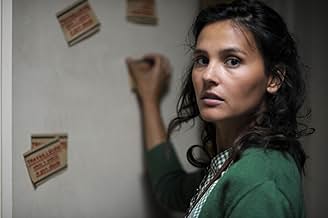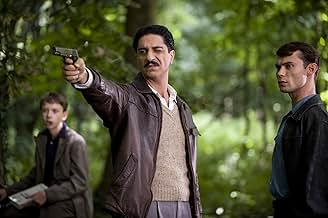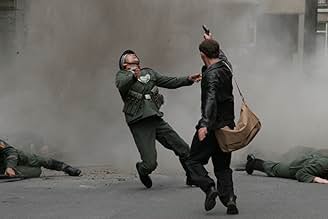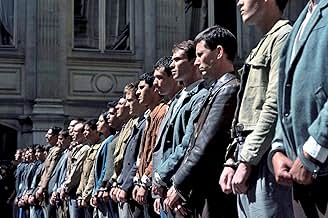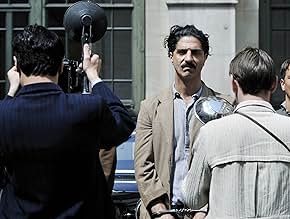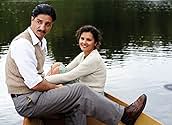L'armée du crime
- 2009
- Tous publics
- 2h 19m
The poet Missak Manouchian leads a mixed bag of youngsters and immigrants in a clandestine battle against the Nazi occupation. Twenty-two men and one woman fighting for an ideal and for free... Read allThe poet Missak Manouchian leads a mixed bag of youngsters and immigrants in a clandestine battle against the Nazi occupation. Twenty-two men and one woman fighting for an ideal and for freedom. News of their daring attacks, including the assassination of an SS general, eventuall... Read allThe poet Missak Manouchian leads a mixed bag of youngsters and immigrants in a clandestine battle against the Nazi occupation. Twenty-two men and one woman fighting for an ideal and for freedom. News of their daring attacks, including the assassination of an SS general, eventually reaches Berlin.
- Awards
- 4 wins & 1 nomination total
Featured reviews
Without wanting to get into a petty discussion on whether The Army of Crime is better than 2009's other World War Two resistance-style thriller Inglourious Basterds, let it be known that as Tarantino's recent outing dealt with similar overall subject material; his characters were, certainly in the case of the heroine, running on a distinct character arc of revenge as those at the centre of all of it adopted roles equal to cartoon characters. The maiming and gratuity these people known as the Basterds were capable of was thrust unto us very early on as these gutsy; no-nonsense; Southern-drawl spouting sadists out to beat; kill; pillage and scalp as many Germans as they can find made itself apparent. Whilst it all sounds like a lot of fun, Army of Crime presents its leads, indeed some of whom are as young as the Basterds and as seemingly angry as the Basterds, but does so in a more natural and realistic light. Observing Robinson Stévenin's character named Marcel, here, as he transforms from a petulant youth whom has a girlfriend and whose hobbies include swimming into a creepy and unnerving individual, is more rewarding than having comic book creations already established to be of that ilk bully and push their way through specific obstacles.
But Guédiguian does his best to refrain from giving us a character to obviously align ourselves with, indeed resisting the use of a specific protagonist. Instead, he spreads around the plight of these people pretty evenly: men; women; French-born individuals; Armenian immigrants; youngsters and elder people, there is no prejudice towards one 'type' of person being braver or more heroic or getting more of a study. For some, this technique will feel sporadic; making the film come across a weighty and quite heavy piece without an individual to truly latch onto resulting in some audiences being turned off. Heading in, I had no knowledge of the true story element to proceedings; but it would go a long way in describing the natural sense Guédiguian gets across. Not knowing how everything turned out and not knowing what became of most involved is, I think, a pleasure amongst many to be had out of The Army of Crime.
The film's documenting of violence and how violence and the hatred of an occupying force in the Nazi soldiers can combine in propelling people to psychological places they might well have been unsure previously existed within themselves, is an interesting side-dish for The Army of Crime. Some characters slip into a brutal, hate-filled stupor easier than others; blasting their way through codes of morality in a rage of fury like nobody's business. For others, that transition is more difficult but not necessarily impossible. In the case study of young Frenchman Thomas Elek (Leprince-Ringuet), much is set up that his temperamental attitudes and short fuse exists and can rather easily get him into trouble. After being berated with an anti-Semitic remark by a fellow class-mate, he sits in the principal's office and is forced into hearing his highly attractive prospects for the future in front of him laid out, the light dim enough to have half his face covered by pitch darkness, the other half in brilliant light. The combination of the authoritarian individual speaking of the future and later roles the young man may very well adopt combined with that steely expression complete with use of lighting suggests a link to more than one possible future.
But Thomas is not as much-a live wire as the aforementioned Marcel, a rag-tag; leather jacket sporting; rough and ready looking young man whom gets highly agitated early on at a tailors over seemingly nothing. He hates the Germans; loves his swimming and maintains an odd, semi-aggressive relationship with girlfriend Monique (Naymark). There seems to be an initial element of seemingly harmless shenanigans behind the first time Marcel engages in illegal activity of a resistance sort, when hundreds of red pages are dropped from a two storey building encouraging rebellious behaviour against the Germans. But this occurrence plays a more important role in highlighting Marcel's advances through the film, in the process taking everything far more seriously and when the snatching of his father by the German's occurs, moves his plight into a more personal realm.
One individual, a middle aged man named Missak played by Simon Abkarian, is someone with prior experience of conflict between nations; he swears he will not kill anyone whilst involved in the resistance, and the pain on his face is agonising early on when he confesses to having to leave behind his fellow inmates at a local German built prison housing other arrested intellectuals, even if it meant saving his own life. The praise that he receives later on when a particular act of bravery, although essentially rendered heroism by those within the circles given the scenario, does further stoking to his morally torn core. Director Guédiguian even finds room to encompass that old 'two sides of the same coin' routine when, around a table (during which these exchanges usually happen), factions within the group demand different things out of the entire process; degrees of antagonism lead by a female character who wants her voice heard. The film is a rewarding exercise in both character study and slow burning drama.
Marcel Ophüls' 1969 documentary The Sorrow and the Pity is all anyone needs to see to comprehend the loathsome extent to which the government in France (uniquely) collaborated with murderous fascists. However folks are no longer keen on seeing four hour long black and white documentaries what with their absence of music video effects and popular music and such. So Guédiguian has revived the history, and not just for revival's sake, also to counter contemporary anti-immigrant prejudice. Whilst the naturalised French, in large proportion failed to resist the Nazis, many French immigrants on the other hand laid down their lives in the Communist resistance. By contrast, the low point of the entire collaboration was when a twentieth century French police force decided to resurrect the Carthaginian traditions of mass child sacrifice, and chose as their Tophet, the Velodrome d'Hiver. Without the help of a single Wehrmacht soldier, SS soldier, or Gestapo thug, the French police rounded up 13,000 Jewish souls including 4,000 children, who were then shipped off to Auschwitz. Against these existential lepers of the Gendarmerie stood Missak Manouchian and his band of fighters (the FTP-MOI), many of whom had already fought the tide of fascism in Spain.
Manouchian is a very interesting character who perhaps received the most character development of all the fighters. He was an Armenian refugee, who survived the Armenian Genocide, which was perpetrated by the Ottoman Army. Out of the silence that followed his terrifying experiences grew his poetry, which was beautiful (based on the example we see in the film). He has to take two key compromises during the film. In order to escape from a camp of hostages, he has to sign a document declaring that he is not a communist. Initially he refuses to sign, but in order to live he eventually does. The second key compromise is when he agrees to kill even though he does not believe in killing, calling it "unethical". It is very difficult for the fighters, they are so full of life, they decide that they must be the enemies of the enemies of life.
Please note that there is a scene of gruelling torture in this film, committed of course by the French police.
It's one of those rare films that is actually edifying, where you come out with a will to live, a will to do right, and a will to speak out against racial intolerance. It is the polar opposite of the crass and odious Inlgorious Basterds, still playing at the cinema, and attracting over a hundred times more spectators.
Aside from the technical brilliance of the film in its fine classic film making, the movie is about heroic men and women who risked their lives for their country even though many of the characters were immigrants. These men and women loved France and died for their rights as well as for the rights of their families and fellow citizens. There were some controversies surrounding this film due to possible historical inaccuracies, yet, I found this movie objective in its portrayal of the characters. There are no long drawn melodramas here but just characters who are compelled to fight for their freedom and the rights of others. I highly recommend this film.
Guédiguian's film lacks the noirish flavor of Melville or the Butch Cassidy and Sundance panache of Madsen's film; but it starts well with Grégoire Leprince-Ringuet and Robinson Stévenin as two brave young men who begin acting on their own, and later are recruited to serve a more organized cause. There were always contrasts between young upstarts and disciplined old-timers. Resistance fighters worked outside the law and sub rosa; the "shadow" army was an army of "crime." Though the phrase "Army of Crime" is a Vichy smear issued after the principals of this story were rounded up and eliminated, the resistance life always attracted rebels and outliers.
The gentle Armenian poet Missak Manouchian (Simon Abkarian) is the leader. His ballsy girlfriend Mélinée (the lovely Virginie Ledoyen) marries him and becomes a passionate supporter after his release from internment gradually turns him from peaceful propagandist to one capable of throwing a grenade into a German marching squad and taking out a dozen German soldiers (an incident neatly filmed here). He gets to know fiery young Marxist bomb-rigger Thomas Elek (Leprince-Ringuet) and swim-champion-pistol killer Marcel Rayman (Stévenin). Marcel becomes infuriated when his parents are taken away and he learns that he won't ever see them again. He begins asking one German officer after another for a light and then pulling a pistol and killing them. He's good at less close range too and gives Missak a lesson in marksmanship. Thomas blows up a Nazi literary gathering by planting a big copy of Das Kapital with a time bomb inside.
Older group leaders periodically chide the younger ones for acting independently and not maintaining cover; but it is one of the older ones who eventually names many members of the group after capture. Various group scenes, including an Armenian musical celebration with Zorba-style performances visited by a group of French cops, show that the authorities are onto the foreign communists and the rashness of one can endanger many.
We get a look at French cops called upon by German occupiers to squash the resisters. They enlist a certain Inspector Pujol ( Jean-Pierre Darroussin), who plays a dubious Judas game of informing, rounding up Jews, and gaining rapid promotion by the French Gestapo while simultaneously sympathizing with the partisans, sleeping with a Jewish girl, and doling out favors to her, including gentler treatment for her interned family members. She wants to be a partisan too, but seems destined to go the way of the anonymous protagonist of Max Färberböck's A Woman in Berlin.
The FTP-MOI throws out flyers (from above, so they won't be seen) urging the French to sabotage Vichy-run industries. Their other mission is to strike visible blows at the Nazis, assassinating major figures of the Nazis in France like General Julius Ritter.
A theme of the film is the complex bonds forged among immigrants and the loyalties among resisters. Missak , whose parents were murdered by Turks, looks upon his Parisian communist friends as his new adopted family. Marcel knows what remains of his family is only his little brother Simon (Léopold Szabatura), and so takes him everywhere; unfortunately that meant that in a raid that targets Marcel, Simon is taken away. An original touch is a homage to the young militant, Henri Krasucki (Adrien Jolivet), who took it upon himself to bring Simon back alive from the concentration camp where they were sent.
In The Army of Crime, the mix of nationalities and motivations is continually interesting and harmonizes nicely with the picture of how quite disparate individuals came together Very important also is that toward the end, Guérdiguian films sequences of the mass corralling and deportation of Jewish people by the French out of a stadium, an infamous moment that deserves to be seen as well as read about. The film is less effective in evoking strong emotion, and despite its generally favorable reception in September in France (after a Cannes summer debut), it's been criticized for a lackluster mise-en-scene. Some communist historians in France have insisted that Marcel is over-mythologized; that there was more restraint and coordination and more direct Soviet supervision than is shown. However the film's strengths remain its focus on youth and its strong ethnic and cultural mix.
This is involving, fascinating stuff, and as good an evocation of that place and time as I can think of, but it doesn't seem as personal as the other films by Guédiguian that I've seen -- The Town Is Quiet (in US theaters) and Lady Jane (SFIFF). But since he is a communist of working-class origins with an Armenian father, it may be in another sense the most personal thing he has done. Another film of his, the 2006 Armenia/Le voyage en Arménie, is about rediscovering Armenian roots.
Shown as part of the Rendez-Vous with French Cinema at Lincoln Center, March 2010.
Did you know
- TriviaCharacters Micha Aznavourian (Serge Avedikian) and Knar Aznavourian (Christina Galstian) were, in real life, the parents of singer and actor Charles Aznavour. Whilst Charles does not feature, as a character, in the film, he is briefly mentioned by his parents (as characters), around 42' 55" into the movie, as having early success as a child singer.
- GoofsWhen showed up to the press after being arrested in November 1943, a member of the group tells a policeman the FFI will avenge them when they come. The FFI (Forces Francaises de l'Interieur) was regrouping several resistance groups and was created in 1944.
- ConnectionsReferenced in The Tonight Show Starring Jimmy Fallon: Adam Sandler/Judd Apatow (2015)
- SoundtracksString Quartet No.17 in B-flat major K. 458
Written by Wolfgang Amadeus Mozart (as Mozart)
Sung by Delphine Bardin, Laurent-Benoit Ostyn, Jean-Claude Tchevrekdjian (Claude Tcheurekdjian), Vincent Dormieu, Olivier Perrin
Enregistrés par Simon Derasse
- How long is Army of Crime?Powered by Alexa
Details
- Release date
- Country of origin
- Official site
- Languages
- Also known as
- Army of Crime
- Filming locations
- Production companies
- See more company credits at IMDbPro
Box office
- Gross US & Canada
- $37,031
- Opening weekend US & Canada
- $8,102
- Aug 22, 2010
- Gross worldwide
- $1,199,877
- Runtime2 hours 19 minutes
- Color
- Sound mix
- Aspect ratio
- 1.85 : 1
Contribute to this page



